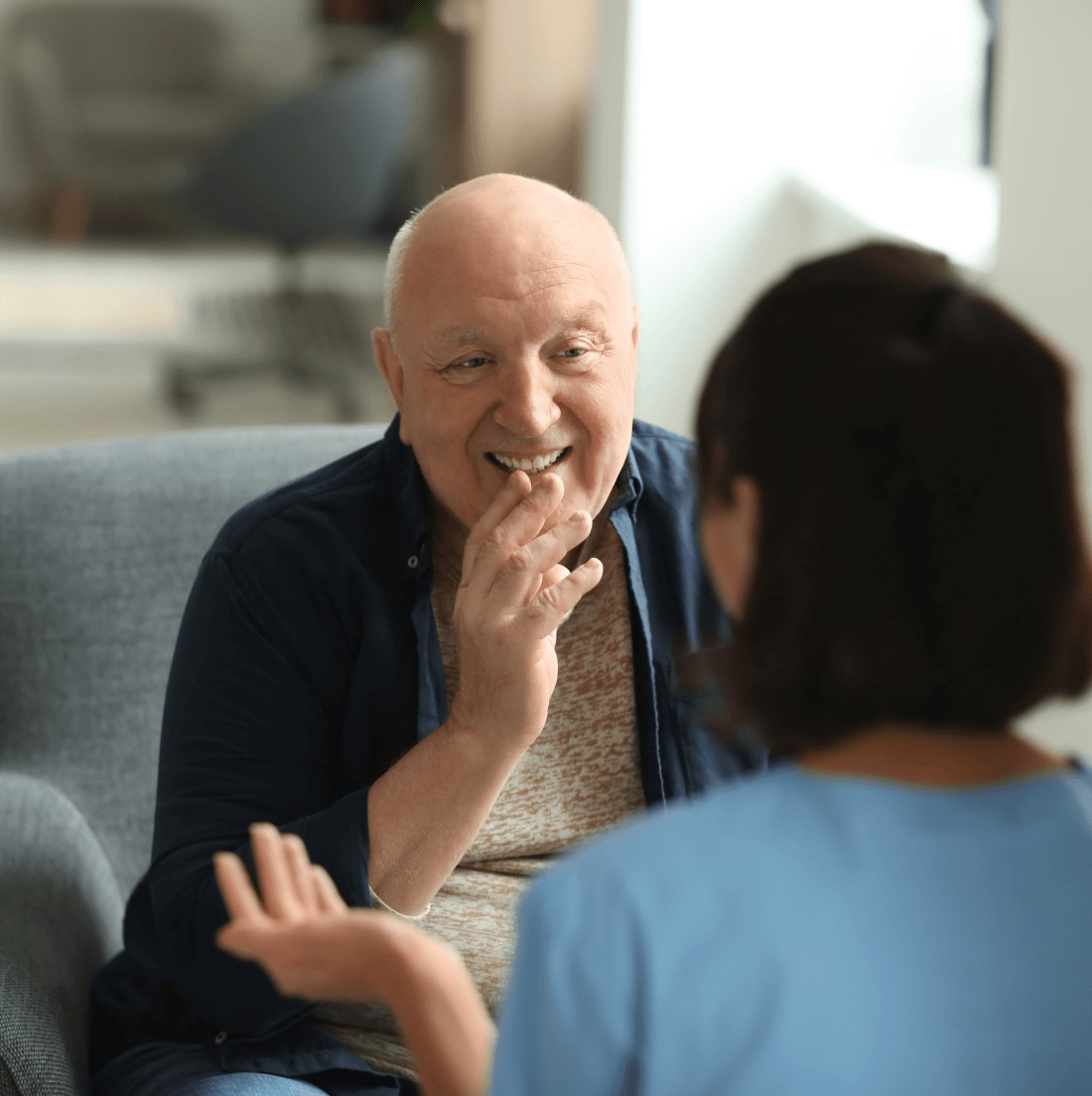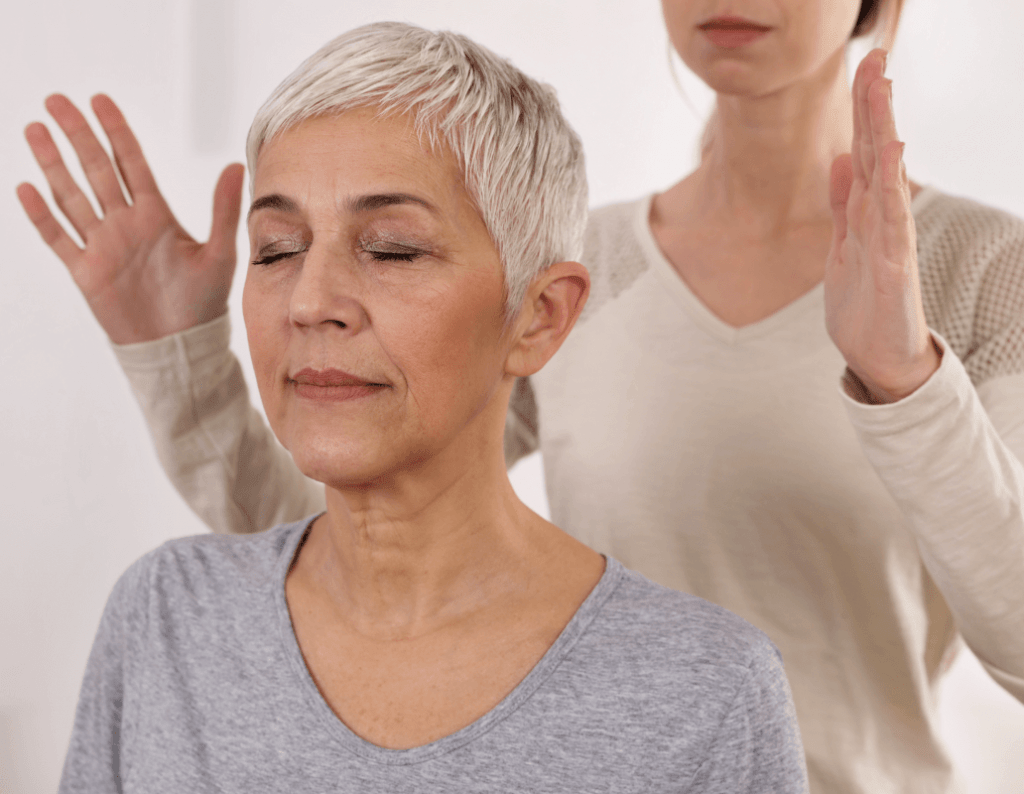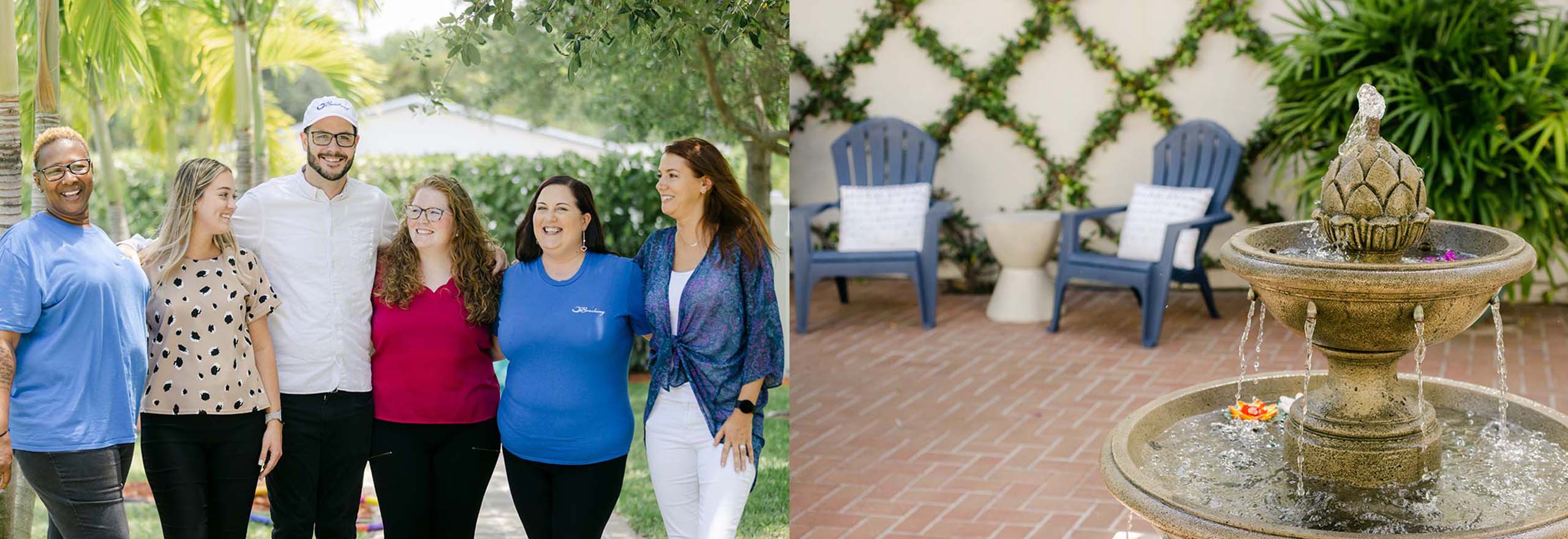You may be ready for outpatient treatment if you have completed residential treatment, have a stable living environment, can manage daily responsibilities while maintaining sobriety, and have developed basic coping skills for managing cravings and triggers. Our team can assess your readiness during a consultation.


Comprehensive Outpatient Rehab Treatment in West Palm Beach, Florida
Outpatient rehab at Beachway provides the structured support you need to maintain your sobriety while rebuilding your life. Our comprehensive programs combine evidence-based addiction treatment with mental health care, helping you develop the skills for lasting recovery while managing work, family, and daily responsibilities.
Sobriety is a life-long pursuit. Recovery doesn’t stop after inpatient or long-term rehabilitation, which is why outpatient rehab is a critical aspect of a person’s long-term success in staying sober.
The Science of Outpatient Recovery: Outpatient rehab is a proven continuum of care that helps sustain long-term recovery through ongoing therapy, support, and access to clinical programs. Research shows that individuals who complete outpatient treatment following residential care have significantly higher long-term recovery success rates.
Sobriety is a life-long pursuit that requires ongoing support and skill-building. Recovery doesn’t stop after inpatient or long-term rehabilitation, which is why outpatient rehab is a critical aspect of a person’s long-term success in staying sober while reintegrating into daily life with confidence and practical recovery tools.
Understanding Outpatient Rehab Therapy and Recovery Support
Addiction treatment involves a continuum of care, and that’s exactly what we provide to our patients here at Beachway. Our integrated approach recognizes that successful recovery requires treating both addiction and mental health conditions simultaneously.
Comprehensive Recovery Journey: Treatment can begin with inpatient rehabilitation and, if determined medically necessary by our clinicians, detoxification. Upon completion of these programs, a person begins their new journey with the help of aftercare services that assist in developing the skills and strategies needed to reenter everyday life successfully. At that point, a person can continue care via outpatient rehab, focusing on real-world application of recovery skills.
Dual Diagnosis Integration: Our outpatient mental health treatment offers comprehensive support for people who need ongoing care while managing daily responsibilities. It encompasses any psychotherapeutic treatments provided by licensed professionals outside a hospital or residential facility, with special emphasis on treating co-occurring mental health conditions that often drive addictive behaviors.
This form of treatment includes access to individual, group, and family therapy, holistic therapies, neurotherapy, and a comprehensive range of recovery-focused programs provided at Beachway. We also offer alumni groups, where positive peer influence and shared recovery experiences further support life-long sobriety.
Outpatient Rehab for Substance Abuse and Mental Health Recovery in West Palm Beach, FL
Overcoming substance abuse while managing the pressures of daily life requires specialized skills and ongoing support. Our outpatient drug and alcohol treatment helps patients balance their daily routines with comprehensive outpatient substance abuse treatment rehab, making it an ideal recovery option for those ready to apply their sobriety skills in real-world settings.
Integrated Dual Diagnosis Approach: Our integrated dual diagnosis approach recognizes that successful recovery requires treating both addiction and mental health conditions simultaneously. Research shows that up to 75% of individuals in outpatient treatment have co-occurring mental health conditions, making our comprehensive psychiatric care essential for sustained recovery.
In outpatient rehab, people receive treatment for co-occurring disorders that may be driving substance abuse, such as depression, anxiety, or PTSD. Through the use of evidence-based therapies and continuous care from mental health professionals, patients receive comprehensive, holistic support and treatment that addresses both addiction and underlying mental health conditions.
Flexible, Comprehensive Care: A person in recovery can attend Beachway’s outpatient rehab clinic 5 days a week for any type of service. Our clinical and medical staff are fully accessible, with therapists and specialists who can help manage medications, provide crisis intervention when needed, and adjust treatment intensity based on individual progress and life circumstances.
Outpatient rehab services include include holistic therapy, family therapy, and individual therapy with a counselor who ensures a continuum of care focused on practical recovery application and long-term sobriety maintenance.
Coordinated Recovery Support: Beachway also offers a flexible, accessible approach to outpatient rehab services. We create personalized care solutions, and if necessary, we can partner with sober living facilities that also assist with coordinating transportation for patients between the facility and Beachway for treatment. In some specific instances, we may even offer sober living accommodations for outpatients.
Because Beachway Therapy emphasizes a continuum of care, many of our outpatient program patients have already completed an inpatient program with us. Some patients enter outpatient treatment directly from inpatient care as a step down in supervision, while others may have previously attended inpatient treatment and feel returning to the outpatient program may be necessary to maintain their recovery and address new life challenges.
This is beneficial to the healing process because it means, in many cases, those attending the outpatient program have already met and familiarized themselves with the therapists in inpatient treatment, facilitating a natural, seamless transition that supports continuity of care and trust-building essential for recovery success.

Categories of Outpatient Rehab in West Palm Beach
The three main categories of substance abuse outpatient treatment offered at Beachway include Partial Hospitalization (PHP), Intensive Outpatient (IOP), and Standard Outpatient Programs (OP). Each level provides different intensities of care while maintaining focus on both addiction recovery and mental health stability.
People attending treatment in an outpatient setting can expect to attend several individual therapy sessions to assist with addressing underlying mental health issues that may drive substance abuse, such as anxiety, depression, or trauma. They may also join group therapy sessions for peer support and to share experiences with others who understand their recovery journey and can provide accountability and encouragement.
Holistic Recovery Approach: Holistic therapies, such as yoga and art therapy, also play a crucial role in Beachway’s outpatient mental health treatment. These holistic therapies address and improve overall well-being while participants develop additional coping mechanisms to assist as they graduate from outpatient rehab and maintain long-term recovery independence.
Outpatient rehab in Florida is particularly beneficial to participants who want the benefits of rehabilitative treatment but can’t step back from their daily duties, such as a job or family responsibilities. In an outpatient setting, they receive most of the same recovery-focused benefits, such as medical supervision, intensive treatment, and support, without having to stay in a hospital while learning to apply recovery skills in real-world environments.
This level of outpatient treatment generally provides 20 or more hours of services per week for a person who doesn't require 24/7 care but needs intensive support for both addiction and mental health recovery. This program meets the needs of people struggling with addiction and co-occurring conditions who are ready to begin practicing recovery skills while maintaining some independence.
PHP Benefits for Recovery:
- Intensive daily structure while living at home or in sober living
- Comprehensive psychiatric care and medication management
- Daily group therapy focused on practical recovery skills
- Individual therapy for personalized recovery planning
- Family therapy to rebuild healthy relationships
- Transition planning for step-down to less intensive care
PHP clients can access Beachway's full spectrum of therapies, just as our other patients do. Simply put, PHP is a combination of intensive therapeutic support with increased independence. It includes comprehensive therapy during the day while the patient practices recovery skills in their living environment at night.
This level of outpatient treatment usually includes 9 or more hours of services per week to support a person who's struggling with addiction and dual diagnoses while managing work, family, or educational responsibilities. The organized outpatient services include a range of individual, group/family therapy, and holistic rehab focused on real-world recovery application.
IOP Recovery Focus:
- Flexible scheduling around work and family commitments
- Relapse prevention planning and trigger management
- Building accountability systems and sober support networks
- Managing cravings and difficult emotions without substances
- Integration of recovery values into daily life
- Crisis intervention support when challenges arise
Outpatient treatment consists of 1-2 hours of services, multiple days a week. This is designed to support ongoing recovery maintenance and can range from motivational enhancement therapies and strategies to Beachway's range of holistic addiction treatment, therapies, and support groups.
OP Long-Term Recovery Support:
- Ongoing individual therapy for continued recovery growth
- Alumni support groups and peer mentorship
- Family therapy for continued relationship healing
- Psychiatric care and medication management
- Crisis support and additional counseling when needed
- Long-term recovery planning and goal setting
Overcoming substance abuse while maintaining daily responsibilities requires ongoing support and skill refinement. An outpatient rehab solution for substance abuse isn't for everyone, but for those who can manage balancing their daily routines with outpatient substance abuse treatment rehab, it's an excellent recovery option that builds independence while maintaining professional support.

Building Long-Term Recovery Skills in Outpatient Treatment
Our outpatient programs focus on practical recovery skills that support lasting sobriety in real-world environments. Unlike residential treatment, outpatient care allows you to immediately practice these skills in your daily life while having professional support available.
Comprehensive Relapse Prevention in Outpatient Treatment
Outpatient treatment requires strong relapse prevention skills since you’re managing recovery in real-world environments with daily exposure to potential triggers and stressors.
Essential Relapse Prevention Skills:
-
- Identifying high-risk situations and developing specific action plans
- Building emergency support systems for challenging moments
- Learning to navigate social situations and peer pressure
- Developing healthy stress management techniques for work and family pressures
- Creating accountability structures with family, friends, and recovery peers
- Understanding the difference between lapse and relapse and how to respond to each
- Managing cravings and difficult emotions without turning to substances
HALT Method Application: Patients learn to recognize when they’re Hungry, Angry, Lonely, or Tired—common relapse triggers in daily life—and develop specific strategies for managing each state without compromising their sobriety.
Maintaining Mental Health Stability in Outpatient Recovery
Outpatient treatment provides ongoing mental health support essential for individuals managing both addiction recovery and co-occurring mental health conditions while handling daily responsibilities.
Mental Health Support Includes:
-
- Regular psychiatric evaluations and medication management
- Depression and anxiety management strategies adapted for daily life
- Trauma processing in a safe, structured environment
- Stress management techniques for work and family pressures
- Crisis intervention support when mental health challenges arise
- Integration of mental health care with addiction recovery goals
Dual Diagnosis Monitoring: Our team provides continuous assessment of how mental health symptoms may impact recovery, adjusting treatment intensity and focus as needed to maintain both sobriety and psychological stability.
Applying Recovery Skills in Daily Life
Outpatient treatment bridges the gap between treatment and independent living by teaching practical application of recovery skills in real-world situations.
Workplace Recovery Support
-
- Managing stress and triggers in work environments
- Communication strategies for discussing recovery needs with employers when appropriate
- Building confidence in professional settings while maintaining sobriety
- Balancing career goals with recovery priorities
- Developing healthy work-life boundaries that support recovery
Family and Relationship Recovery
-
- Rebuilding trust and healthy communication with family members
- Setting boundaries that support recovery while maintaining relationships
- Parenting in recovery and addressing family trauma
- Dating and social interactions in early recovery
- Managing family events and social situations that may involve alcohol or triggers

What to Expect in Your Outpatient Recovery Journey
Month 1-3: Stabilization and Skill Building
-
- Focus on stabilization, learning basic coping skills, and establishing recovery routines
- Intensive relapse prevention planning and trigger identification
- Building initial accountability systems and support networks
- Regular psychiatric evaluation and medication adjustment if needed
Month 4-6: Independence Building
-
- Developing independence while maintaining strong therapeutic support
- Practicing recovery skills in increasingly challenging situations
- Building confidence in work, family, and social environments
- Preparing for reduced treatment intensity based on progress
Month 6+: Transition and Long-Term Planning
-
- Transition planning for step-down to lower intensity care
- Building long-term recovery lifestyle and maintenance strategies
- Alumni support integration and peer mentorship opportunities
- Crisis planning and ongoing support access
Our flexible approach means your treatment intensity can adjust based on your progress and life circumstances, ensuring you always have the support you need while building toward independent, sustainable recovery.

Evidence-Based Therapies in Outpatient Recovery

Outpatient clients can access dialectical behavior therapy (DBT), a type of cognitive behavioral therapy that helps people validate and communicate an understanding of their behaviors while developing practical skills for managing difficult emotions and interpersonal relationships.
Research shows DBT is particularly effective in treating addiction and mental health conditions simultaneously, such as depression, anxiety, and bipolar disorders. In outpatient settings, DBT skills are immediately applicable to daily life challenges, making it an ideal therapy for individuals managing recovery while handling work, family, and social responsibilities.
DBT Skills for Daily Recovery:
- Distress tolerance for managing cravings and difficult emotions
- Emotion regulation techniques for workplace and family stress
- Interpersonal effectiveness for rebuilding healthy relationships
- Mindfulness practices for staying present and grounded in recovery

Individual Therapy in Outpatient Rehab
Outpatient rehab provides individual therapy with a counselor who specializes in both addiction recovery and mental health treatment. It's a common step after inpatient rehab, providing ongoing support for the individual while they navigate real-world challenges and continue building recovery skills.
Individual Therapy Focus Areas:
- Personalized relapse prevention planning
- Processing trauma and underlying mental health issues
- Building healthy coping mechanisms for daily stressors
- Setting and achieving recovery and life goals
- Managing co-occurring mental health conditions
- Developing healthy relationships and communication skills
Beachway is a member of the National Association of Addiction Treatment Providers (NAATP) and is CARF-accredited as a rehab clinic that delivers industry-standard care. Our outpatient rehab services provide care that follows industry best practices with evidence-based treatments specifically designed for dual diagnosis recovery.

Group therapy sessions at Beachway help patients create a social circle where they can relate to those around them while learning from others who understand the challenges of maintaining recovery in daily life. These sessions are led by addiction professionals, such as counselors, educators, and addiction-focused health care professionals who specialize in addiction prevention, intervention, treatment, recovery support, and education.
Group Therapy Benefits:
- Peer accountability and support for recovery goals
- Learning from others who have successfully navigated similar challenges
- Practicing communication and social skills in a safe environment
- Building a sober support network for ongoing recovery
- Sharing experiences and strategies that work in real-world situations
- Reducing isolation and building community connections

Holistic offerings include art therapy guided by trained art therapists and equine therapy led through The Professional Association of Therapeutic Horsemanship International (PATH Intl.) and the Equine-Assisted Growth and Learning Association (EAGALA).
Comprehensive Holistic Approach: Beachway also offers music therapy, psychodrama, and a range of spa services, along with chiropractic care and acupuncture, to support detoxification, reduce pain and discomfort, and ease the continued recovery process while promoting overall wellness and stress management essential for outpatient success.
Benefits for Outpatient Recovery:
- Stress reduction techniques applicable to daily life
- Creative expression for processing emotions and experiences
- Physical wellness support for overall recovery health
- Mindfulness and relaxation skills for managing triggers
- Building healthy hobbies and interests that support sobriety

Many people find their addiction is a response to trauma they've buried away and attempted to ignore. Because trauma can impact the brain and how its electrical system works, unresolved traumatic events can affect how well a person self-regulates, making trauma treatment essential for sustainable recovery.
Trauma and Addiction Recovery: At Beachway, treatment can include trauma-focused group counseling with a therapist who specializes in trauma to help solve the underlying cause of addiction. In outpatient settings, trauma work focuses on practical application of healing skills while patients navigate daily life and potential triggers.
Trauma Recovery in Daily Life:
Processing trauma symptoms while managing work and family responsibilities
- Building safety and stability skills for real-world environments
- Developing healthy coping mechanisms for trauma triggers
- Creating support systems that understand both trauma and addiction recovery
- Learning to recognize and manage trauma responses in daily situations

Family Therapy in Outpatient Rehab
Family recovery services and programs help heal loved ones and create a strong support network for a person who's living a new, sober life. Family therapy is guided by a specialist in addiction counseling for families and focuses on practical relationship healing that supports long-term recovery success.
Family Recovery Focus:
- Rebuilding trust and healthy communication patterns
- Education about addiction and mental health as medical conditions
- Setting boundaries that support recovery without enabling
- Addressing secondary trauma experienced by family members
- Learning how to support recovery while maintaining healthy relationships
- Breaking generational patterns of addiction and dysfunction
Family Involvement Benefits: Research shows that family involvement in outpatient treatment significantly improves long-term recovery outcomes, making family therapy an essential component of comprehensive outpatient care.

Alumni Support and Long-Term Recovery Community
Ongoing Support Beyond Treatment
Alumni services include:
-
- Monthly alumni meetings and social events
- Peer mentorship opportunities with successful graduates
- Crisis support and additional counseling when needed
- Career and educational guidance for rebuilding life in recovery
- Family support services for ongoing relationship healing
- Access to continued group therapy and support meetings
Long-Term Recovery Community: Our alumni network creates a lasting recovery community where individuals can continue to support each other, share experiences, and maintain accountability long after completing formal treatment. This peer support is particularly valuable for outpatient graduates who need ongoing community while managing independent living.
Continuing Care Planning: Every outpatient patient develops a detailed continuing care plan that includes specific strategies for maintaining recovery, building a sober support network, accessing resources when challenges arise, and connecting with alumni support services for long-term success.


Explore Our West Palm Beach Outpatient Rehab Program
According to the National Institute on Drug Abuse, substance abuse is like any other chronic disease where there isn’t a cure, but there are evidence-based strategies for successfully managing it long-term. With outpatient therapy at Beachway, a person in recovery can maintain control over their life while building the skills necessary for lasting sobriety and mental health stability.
Our flexible outpatient treatment programs allow patients to continue working, caring for their families, and engaging in other daily activities while receiving the comprehensive support they need at our West Palm Beach rehab. This real-world application of recovery skills, combined with professional guidance and peer support, creates the foundation for sustainable, long-term recovery success.
Comprehensive Recovery Support: Our integrated approach ensures that both addiction and mental health needs are addressed simultaneously, recognizing that successful recovery requires treating the whole person, not just the addiction symptoms.
Help is available, and recovery is possible. For more information about our outpatient programs and how they can support your recovery journey, call us directly or fill out a confidential form online.
Frequently Asked Questions about Outpatient Rehab
How do I know if I'm ready for outpatient treatment?
What happens if I struggle with cravings during outpatient treatment?
Struggling with cravings is normal in early recovery. Our outpatient program includes comprehensive relapse prevention planning, crisis intervention support, and immediate access to counselors when challenges arise. We also provide specific techniques for managing cravings in real-world situations.
How does outpatient treatment address both addiction and mental health?
Our integrated dual diagnosis approach treats addiction and mental health conditions simultaneously through coordinated care that includes psychiatric services, individual therapy, group therapy, and medication management when appropriate. This comprehensive approach improves long-term recovery outcomes.
Can I work full-time while in outpatient rehab?
Yes, our flexible scheduling allows many patients to maintain work responsibilities while receiving treatment. We offer evening and weekend options, and our treatment intensity can be adjusted based on your schedule and recovery needs.
What support is available for family members during outpatient treatment?
We offer comprehensive family therapy, educational resources about addiction and mental health, support groups for family members, and guidance on how to support recovery while maintaining healthy boundaries. Family involvement significantly improves treatment outcomes.
How long does outpatient treatment typically last?
Treatment length varies based on individual needs and progress. Some patients benefit from a few months of intensive outpatient care, while others may continue with lower-intensity support for a year or more. We adjust treatment duration based on your recovery goals and stability.



